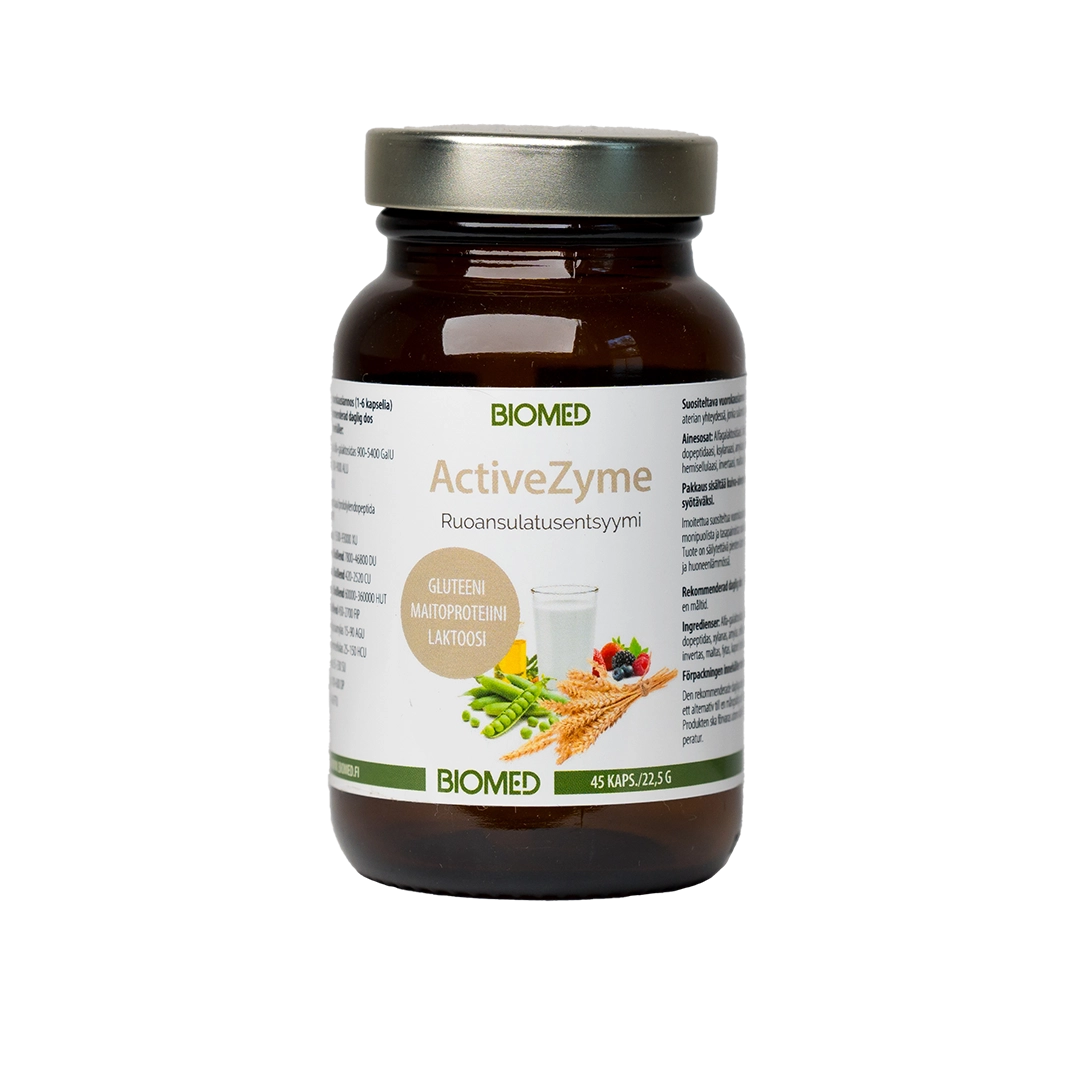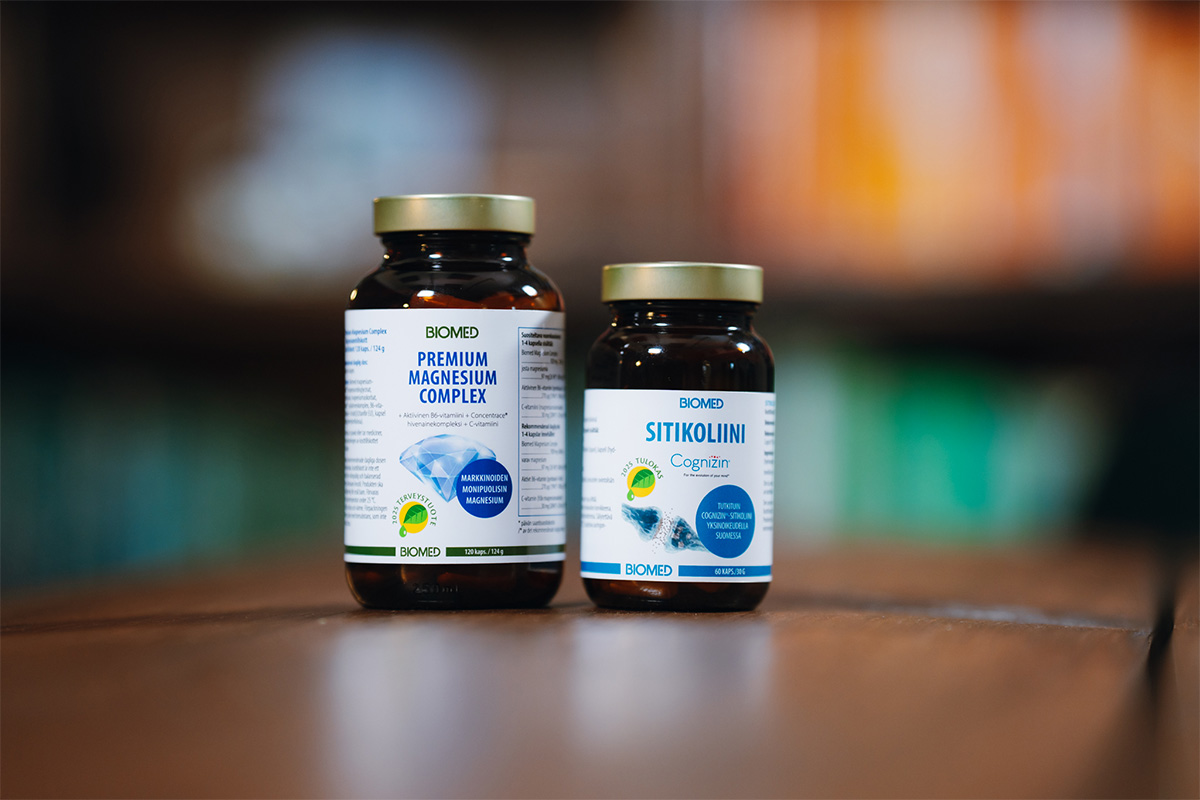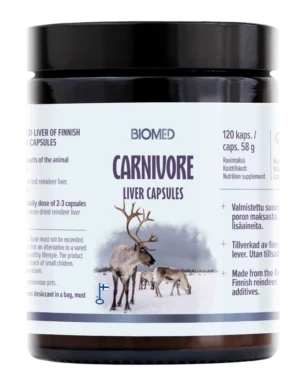Description
ActiveZyme
ActiveZyme is an enzyme preparation whose enzymes break down food proteins, fats and carbohydrates into a better absorbed form. ActiveZyme breaks down grain gluten, milk protein and lactose in particular, but also other foods that cause hypersensitivity.
BioBlend-labelled enzymes are especially balanced mixtures that retain their activity throughout the gastrointestinal tract.
ActiveZyme is also especially good when increasing the amount of vegetables in the diet, or if there is a problem with vegetable digestion. ActiveZyme contains a group of enzymes that soften the structures of vegetables, making them easier to digest. Thus, valuable nutrients are actually utilized.
ActiveZyme utilizes Bio-Blend technology, which means that each enzyme labelled with this label contains multiple enzyme species from the same category. These each work in slightly different pH environments, ensuring that the product breaks down food from the stomach to the small intestine and colon.
Enzyme activity
The activity of enzymes is measured in specific units that indicate their effectiveness. Usually, nutritional supplements are indicated in milligrams or micrograms, but for enzymes, weight does not really say anything. Therefore, the effectiveness is indicated by different letter combinations such as HUT, FIP or GaIU. It is not necessary to understand these units more deeply, but these units make it possible to compare a product with another product on the store shelf.
ActiveZyme is by far the strongest on the market for the following enzymes:
- Alpha-galactosidase (Legumes / flatulence, oedema)
- Propyl endopeptidase (Gluten digestion)
- Xylanase (Vegetable digestion)
In addition to potentially problematic foods, ActiveZyme contains enzymes that break down all of the food’s proteins, fats, carbohydrates, and fibre.
Alpha-galactosidase900 GaIU
- Generally, breaks down gas-forming carbohydrates, especially raffinose and stachyose.
- Especially useful with raw vegetables and legumes (beans, etc.)
- ActiveZyme contains more Alfa galactosidase than other products on the market
DPP-IV
250 DPPU
- Dipeptidyl peptidase (DPP-IV) is an enzyme whose main targets are gluten and casein
- Helps to digest grains and milk proteins
- Please note! Those who suffer of coeliac disease or milk allergy should still avoid these foods, but the enzyme is helpful if you inadvertently ingest milk or grains containing gluten.
Propyl endopeptidase (PEP)60,000 PPI
- PEP is an enzyme that specializes in the breakdown of proteins containing amino acid proline. The structure of gluten contains a lot of proline so PEP breaks down gluten efficiently
- Selective enzyme for gluten in wheat, barley and rye
- ActiveZyme is the only product on the market that contains this enzyme
- Please note! Those who suffer of coeliac disease should still avoid these foods, but the enzyme is helpful if you inadvertently ingest grains containing gluten.
Xylanase15,500 XU
- The job of xylanase is to digest the cell walls of vegetables
- Especially useful when increasing the amount of vegetables in the diet, or the digestion of vegetables is poor
- Helps to better recover the vitamins contained in vegetables
- Strongest concentration on the market (cf. Digest Spectrum 10,000 XU)
Lactase1,500 ALU
- Breaks down lactose (milk sugar)
- Helps to digest lactose in dairy products
Amylase Bio-Blend
7,800 DU
- Dietary carbohydrates must first be broken down into simple sugars in order to be absorbed
- Amylases are enzymes that break down food carbohydrates into sugars
- Digestion of carbohydrates is important because otherwise they cause e.g. flatulence
- Bio-Blend means a mixture of several different amylases so that they work throughout the digestive tract
Protease Bio-Blend60,000 HUT
- Dietary proteins must first be broken down into amino acids in order to be absorbed
- Proteases are enzymes that break down food proteins into amino acids
- Proteins must first be digested into amino acids in order to be absorbed
- Bio-Blend means a mixture of several different proteases so that they work throughout the digestive tract
Lipase Bio-Blend450 FIP
- Dietary whole fats must first be broken down into fatty acids in order to be absorbed
- Lipases are enzymes that break down food fats into fatty acids
- Bio-Blend means a mixture of several different lipases so that they work throughout the digestive tract
Cellulase Bio-Blend420 CU
- Cellulase breaks down cellulose, i.e. plant fibres
- When plant fibres are properly digested, the nutrients contained in vegetables become better available
- Bio-Blend means a mixture of several different cellulases so that they work throughout the digestive tract
Hemicellulase25 HCU
- Hemicellulase breaks down hemicellulose, one of the building blocks of plant cell walls
- When plant fibres are properly digested, the nutrients contained in vegetables become better available
Glucoamylase15 AGU
- Breaks long-chain carbohydrates (starches) into glucose
Invertase
55 SU
- Breaks down sucrose (“table sugar”) into glucose and fructose
Maltase100 DP
- Breaks down dietary maltose into glucose
Phytase10 FU
- Breaks down phytic acid in grains and seeds, which is an antinutrient
- Improves the bioavailability of minerals and micronutrients
ENZYMES
Enzymes are biologically active proteins. They are found everywhere in the nature because they are very precise about what they do and under what conditions. Enzymes are found in the nature in all kinds: decomposing, building, transferring, transforming, combining, and so on, but here we focus on digestion, that is, decomposing enzymes.
Take, for example, gluten-breaking propyl endopeptidase. It is easier to talk about it with the abbreviation PEP. The property of this enzyme is to find all the spots in the proteins that have an amino acid called proline.
As shown in the image on the right, when PEP gets to the vicinity of gluten protein, it breaks the protein chain at all points where there is proline amino acid (P). Thus, gluten is no longer gluten, but a group of loose peptides which are then put on the to-do list of other digestive enzymes until there are only single amino acids left that are absorbed by the body for use.
All digestive enzymes work the same way. They attach to exactly that nutrient they are intended to and begin to “cut” chemical bonds. Without this work, food would not be broken down into small enough parts and could not be utilized by the body. Even the world’s best blender is not able to break down food so small that it would be absorbed as it is, although it certainly facilitates the work of the enzymes that then do the most important job.
Enzyme categories
Digestive enzymes are grouped into three main categories, and although enzymes have names of all kinds, they always fall into one of these three categories.
Proteases
– Break down proteins into amino acids
Amylases
– Break down carbohydrates into sugars (fibres are also considered as carbohydrates)
Lipases
– Break down whole fats into fatty acids
BioBlend technology
BioBlend is an advanced technology used by Biomed that combines enzymes with slightly different “preferences” from each enzyme category.
The principles below apply to all Bioblend enzymes, be it protease, amylase, lipase or cellulase.
pH flexibility
The most important thing that limits the activity of enzymes is the pH of the environment, i.e. acidity. Some enzymes work well in the stomach’s very acidic environment, but cease to function in an alkaline environment of the small intestine. In turn, those enzymes that were ‘sleeping’ in the acidity of the stomach, are activated in the small intestine. Thus, a mixture of enzymes is needed, some of which are active in the stomach, some in the small intestine and some even in the colon. High-quality enzyme preparation continues to work long after the food has been eaten and moved from the stomach forward.
Complete digestion
Another limiting factor is the uncompromising accuracy of enzymes in what they do.
Take, for example, Protease, an enzyme that breaks down protein. Some proteases have the ability to attach and break bonds between certain amino acids, but that is as far as it goes. If digestion relied on only this one protease, the proteins would not digest properly, but the work would be interrupted and cause problems.
Looking at the same picture again as before, if the breakdown of gluten remains only the job of PEP (black scissors), the digestion would not be complete.
The job of the other protease (red scissors) is to break down other bonds. This is necessary so that all amino acids are separated and absorbed into the bloodstream. In reality, there are several scissors of different colours to complete digestion.
Bio-Blend ensures that there is a sufficient selection of enzymes that work in different ways so that the nutrients are completely digested.














Kokeilun perusteella vaikuttaa hyvältä, ilmavaivat vähentyneet.
Auttaa vatsavaivoihin
Tehokas
Vakiotuote temppuilevan vatsan rauhoittamiseen
Hyvin auttaa sulattamaan ruokaa